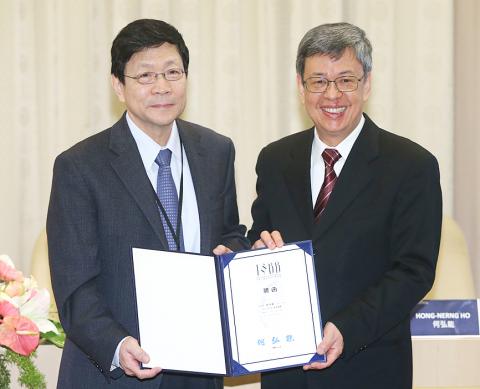Academia Sinica yesterday announced that the Taiwan Biobank, established in 2012, has collected biological information from more than 120,000 volunteers.
The biobank aims to collect genetic samples from more than 200,000 people by 2024 to aid researchers in finding the causes of chronic diseases, as well as their treatment and prevention, Academia Sinica President James Liao (廖俊智) said at the opening ceremony of a symposium on biopreservation and biobanking.
The two-day symposium, cohosted by Academia Sinica’s Institute of Biomedical Sciences, Academia, and the Taiwan Society for Biopreservation and Biobanking, focuses on the sustainability of human biobanks, precision medicine and other issues.

Photo: CNA
Participants are also to hold a round-table discussion of biomedical industry development, ethics, governance and regulations.
The Taiwan Biobank has collected biological data from people aged 30 to 70, including their height, weight, body fat, hipline, waistline, blood pressure, pulse, bone density and pulmonary function, as well as blood sample (30ml) and urine sample (15ml), for genotyping, Academia Sinica said.
Participants were also asked about their lifestyle, diet, living environment, fertility history, and personal and family medical history.
The total length of the human genome is made up of more than 3 billion DNA base pairs, and about 650,000 genetic loci in Taiwanese people can be identified through genotyping, Academia Sinica said, adding that by cross-referencing 650,000 genetic loci with other risk factors, it identified 41 highly precise prognostic biomarkers of diabetes in 2015.
The Taiwan Biobank is the largest infrastructure for Taiwan’s biomedical development, and is the only ethnic biobank in the nation with long-term traceability, Liao said.
The number of voluntary participants has exceeded 120,000, and genotyping and gene chip analysis on more than 100,000 people have been accomplished, which are provided for research and industrial analysis application, Academia Sinica said.
Also present at yesterday’s ceremony were Vice President Chen Chien-jen (陳建仁), Taiwan Biobank Project director Lee Te-chang (李德章), National Health Research Institutes distinguished researcher Tsai Shih-feng (蔡世峯), Taiwan Society for Biopreservation and Biobanking chairman Ho Hong-nerng (何弘能) and nearly 100 academics.

CROSS-STRAIT COLLABORATION: The new KMT chairwoman expressed interest in meeting the Chinese president from the start, but she’ll have to pay to get in Beijing allegedly agreed to let Chinese Nationalist Party (KMT) Chairwoman Cheng Li-wun (鄭麗文) meet with Chinese President Xi Jinping (習近平) around the Lunar New Year holiday next year on three conditions, including that the KMT block Taiwan’s arms purchases, a source said yesterday. Cheng has expressed interest in meeting Xi since she won the KMT’s chairmanship election in October. A source, speaking on condition of anonymity, said a consensus on a meeting was allegedly reached after two KMT vice chairmen visited China’s Taiwan Affairs Office Director Song Tao (宋濤) in China last month. Beijing allegedly gave the KMT three conditions it had to

STAYING ALERT: China this week deployed its largest maritime show of force to date in the region, prompting concern in Taipei and Tokyo, which Beijing has brushed off Deterring conflict over Taiwan is a priority, the White House said in its National Security Strategy published yesterday, which also called on Japan and South Korea to increase their defense spending to help protect the first island chain. Taiwan is strategically positioned between Northeast and Southeast Asia, and provides direct access to the second island chain, with one-third of global shipping passing through the South China Sea, the report said. Given the implications for the US economy, along with Taiwan’s dominance in semiconductors, “deterring a conflict over Taiwan, ideally by preserving military overmatch, is a priority,” it said. However, the strategy also reiterated

‘BALANCE OF POWER’: Hegseth said that the US did not want to ‘strangle’ China, but to ensure that none of Washington’s allies would be vulnerable to military aggression Washington has no intention of changing the “status quo” in the Taiwan Strait, US Secretary of Defense Pete Hegseth said on Saturday, adding that one of the US military’s main priorities is to deter China “through strength, not through confrontation.” Speaking at the annual Reagan National Defense Forum in Simi Valley, California, Hegseth outlined the US Department of Defense’s priorities under US President Donald Trump. “First, defending the US homeland and our hemisphere. Second, deterring China through strength, not confrontation. Third, increased burden sharing for us, allies and partners. And fourth, supercharging the US defense industrial base,” he said. US-China relations under

The Chien Feng IV (勁蜂, Mighty Hornet) loitering munition is on track to enter flight tests next month in connection with potential adoption by Taiwanese and US armed forces, a government source said yesterday. The kamikaze drone, which boasts a range of 1,000km, debuted at the Taipei Aerospace and Defense Technology Exhibition in September, the official said on condition of anonymity. The Chungshan Institute of Science and Technology and US-based Kratos Defense jointly developed the platform by leveraging the engine and airframe of the latter’s MQM-178 Firejet target drone, they said. The uncrewed aerial vehicle is designed to utilize an artificial intelligence computer